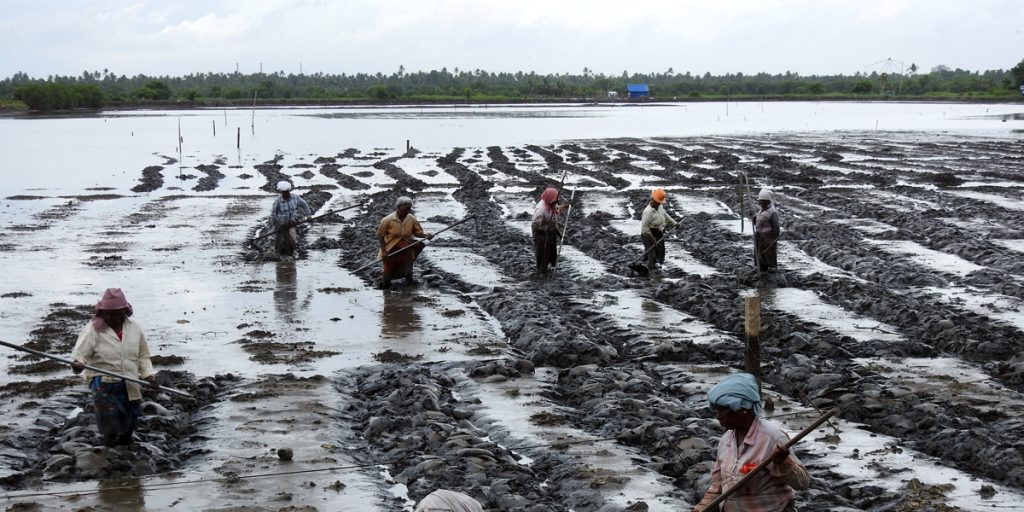
Activities in Kerala are coordinated through the Foundation’s Community Agrobiodiversity Centre (CAbC) in Kalpetta, Wayanad. They are being implemented under three major heads: (i) biodiversity conservation, (ii) education and capacity building and (iii) food and nutrition security. Work under a holistic rural development programme to build the resilience of communities in 30 flood-affected villages across six districts – Wayanad, Ernakulam, Idukki, Alappuzha, Kottayam and Pathanamthitta is reported under SPA 104
203.1 Biodiversity Conservation
Medicinal and Aromatic Rice Initiative: Ten new seed villages (seven in Sulthan Bathery block and one each in Vythiri, Mananthavadi and Panthaloor blocks) were established to promote the on-farm conservation of traditional medicinal and aromatic paddy varieties and 17 paddy varieties are being conserved. The seed villages act as a platform for exchange of seeds of traditional varieties and sharing farming experience. The farmers from these seed villages were given hands-on training in systematically recording the quantities and varieties of seeds exchanged; awareness on the importance of conserving the traditional paddy varieties as well as the need for carrying out panicle selection of varieties for seed purpose every 2 years through seed villages was emphasized. Across Kerala, 4520 kg of traditional paddy seeds were distributed to 142 farmers (3582 kg through 10 seed villages and 938 kg from CAbC). The farmers received a premium price of Rs 143280 by selling 3582 kg of traditional seeds through the seed villages. A yield-enhancement trial of the traditional paddy varieties through organic cultivation was undertaken using four treatments and farmers’ practices: (i) Farmyard manure (FYM) + oilcakes; (ii) vermicompost + oilcakes; (iii) FYM + jeevamruta; (iv) Azospirillum + phosphobacteria + potassium-mobilizing bacteria + FYM and farmers’ practice. Further, two hands-on training sessions on ‘System of Rice Intensification’ were conducted for agricultural labourers; the 54 participants (male: 23; female: 31) were trained on various cultural activities such as seed bed preparation, planting and operation of cono-weeder.
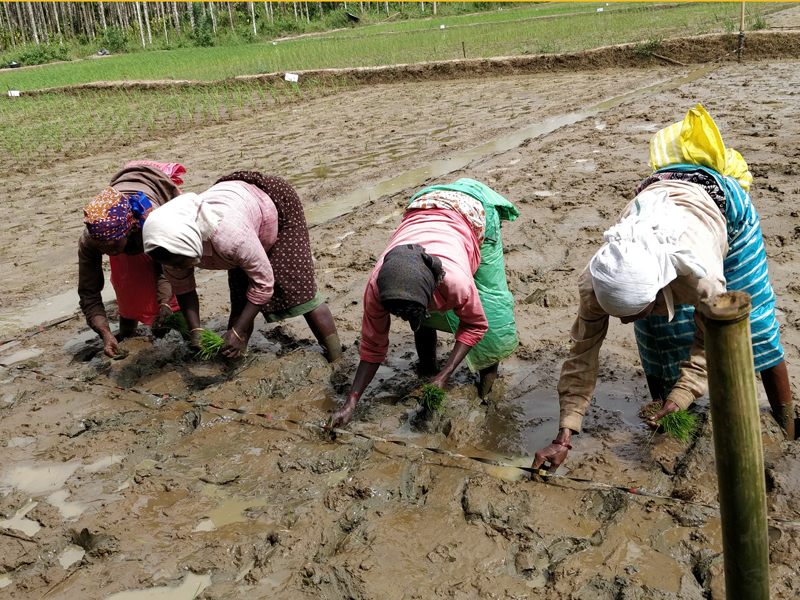
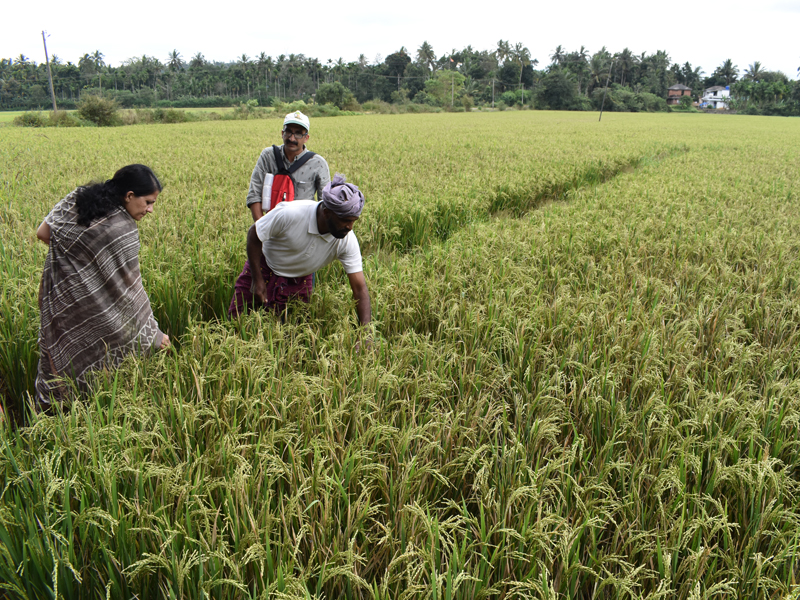
Promotion of Medicinal Plants and Spices: Technical support was extended for WSHGs engaged in medicinal plants and ginger value-addition units. Training support (29 training days) included handling of machineries, maintaining quality of value-added products, ensuring hygienic production environment, packaging and storage. The Navachaithanya Herbal Production unit run by a WSHG with 10 members produced and marketed a total of 147 kg of 10 different value-added herbal products either in powder or in liquid form, namely, herbal tooth powder, thali powder (herbal shampoo), henna powder, thaleesapathradi choornam, pain balm, arrowroot powder, uragulika (gastro tablet), murivenna (multipurpose oil), karkidakalehya and turmeric powder, and earned a gross income of Rs 78000 during the year. The electric drier and pulverizer provided to the unit helped reduce the drudgery involved and the time required for the processing of raw materials.
The ginger value-addition unit run by a WSHG named Ardrakam Ginger Initiative produced and marketed 114 kg of different products, namely, ginger tea cuts, ginger candy, ginger paste, ginger-garlic paste, ginger tamarind mix, ginger mixed muesli, dried ginger powder and dried ginger slice. According to the women who are engaged in ginger processing, the modified ginger peeling machine provided to the group in the first year enhanced the efficiency and the quality of work, saving their time by 50 per cent and considerably reducing drudgery when compared with peeling and washing by hand. Further, a total of 700 kg of organic ginger seed material were distributed to different groups (24 women beneficiaries, 9 tribal farmers) in Wayanad as a means of extending organic cultivation of ginger and to ensure raw material supply for the value-addition unit. Additionally, the unit produced 260 kg of different value-added products from banana, mango, papaya and jackfruit during the off-season of the ginger crop. Overall, the unit was able to generate Rs 1.62 lakhs as gross income during the reporting year.
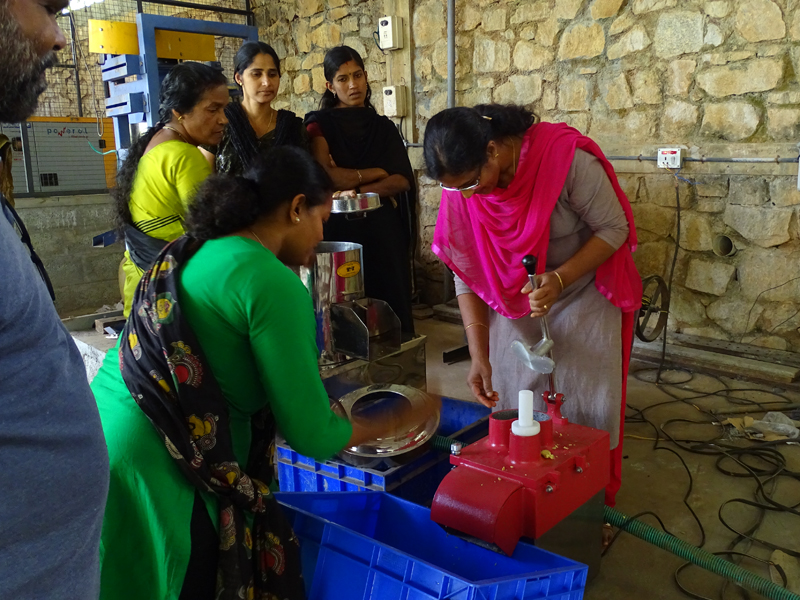
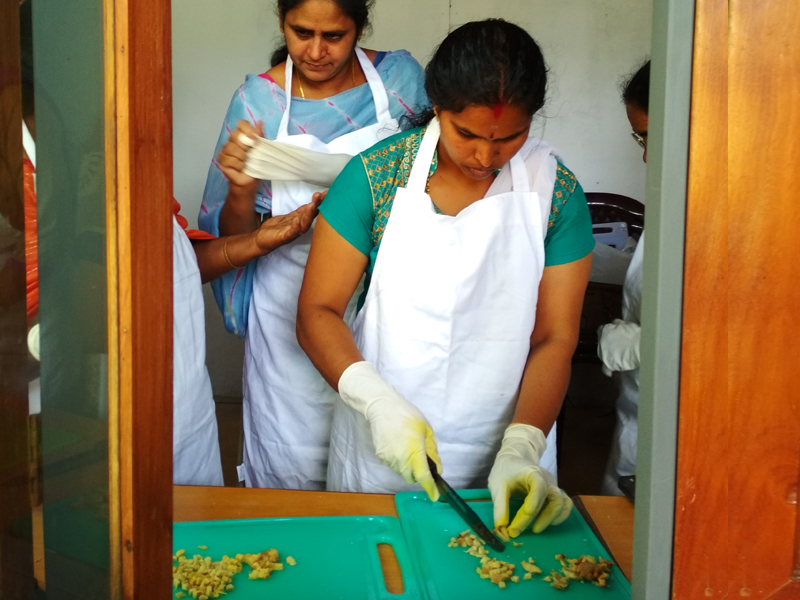
Assessment of Agrobiodiversity Loss Due to Flood in Wayanad: An assessment of agrobiodiversity loss due to floods in Wayanad was conducted using geospatial tools. The study mapped 432 varieties of 48 crops being cultivated at present and identified the crop varieties both vulnerable and resilient to heavy rain, water logging and flood. The resilient varieties are listed in Table 1.
Table 1: Crop varieties identified as resilient to flood and heavy rain
| S. no. | Crop | Varieties |
| 1 | Rice | Thonnooram Thondi, Mannu Veliyan, Mullan Kaima, Chen bavu, Thavalakkannan, Njavara, Palthondi,Chennellu Thondi, Gandhakasala, Malli Kuruva, Ramli and Kakisali |
| 2 | Pepper | Ayimberiyan, Kalluvalli, Karimkotta, Karimunda, Thirumuriyan, Thulamundi, Valankotta, Wayanadan Bolt and Vellanamban |
| 3 | Banana | Charakadali |
| 4 | Dioscoria | Vella kachil, Neelakkachil and Kayyalapoliyan |
| 5 | Turmeric | Wayanadan and Kanthi |
Strengthening Local Biodiversity Governance through Participatory Action: A participatory natural resource mapping exercise was conducted and the management plan for biodiversity developed in four selected GPs, namely, Pozhuthana, Vengappally, Kottathara and Panamaram. This study has helped to sensitise GPs and build their capacity in conserving both natural and bioresources.
M.S. Swaminathan Botanical Garden (MSSBG): The different biological components of the MSSBG are: a garden for conserving the wild and crop diversity such as the plant nurseries, Dhanwanthary Ayurvedic garden, wild food conservatory, climbing plants area, aquatic collections, orchidarium, tuber plants area, fernery, butterfly garden, arboretum, RET conservatory, ornamental plants area, vermicompost unit and WEPIC (Western Ghats Endemic Plant Information Center) and the campus is maintained with adequate care. The database of plant species conserved at the community zone was modified according to the BGCI (Botanic Garden Conservation International) guidelines during the period. The garden was augmented with 22 species of wild relatives of crop plants. It has facilitated visits of a total of 8938 plant lovers and students who were made aware of the importance of biodiversity conservation through guided tours and lecture sessions.
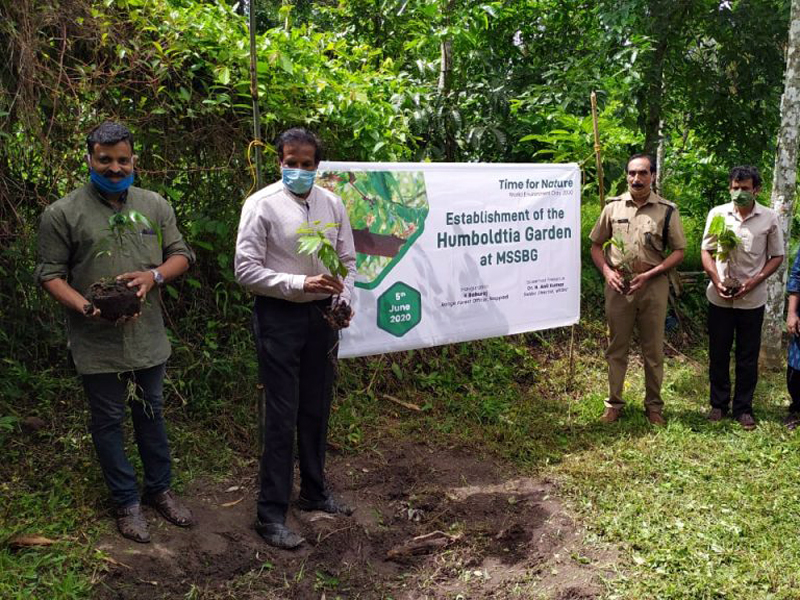
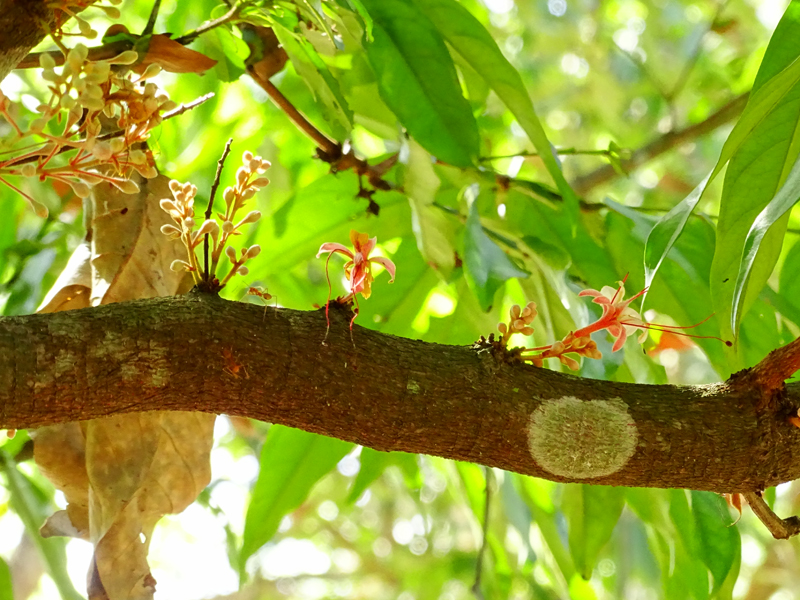
RET and Medicinal Plants Conservation: A list of plants from the Western Ghats suited for Miyawaki forest planting (a technique pioneered by Japanese botanist Akira Miyawaki that helps build dense, native forests) was prepared as part of the conservation activities. The M.S. Swaminathan Herbarium (MSSH) with a collection of 3500 voucher specimens was maintained and 653 specimens were given new accession numbers during the year. The database of the nursery plants was modified and all transactions were computerized, which helps in proper documentation and in generation of increased revenue through plant nurseries.
For conserving threatened plant species, an ex-situ conservatory for the endemic genus ‘Humboldtia’ (Family Fabaceae – Caesalpinioideae) was established at MSSBG. Natural population of eight species of Humboldtia was identified from various protected areas across the Western Ghats, and 632 individuals of these species were procured and maintained at the MSSBG nursery. A new species of Sonerila (named Sonerila sulpheyi) was identified, taking the number of new species described so far to 20.
203.2 Education, Communication and Training
Rainfall data and other relevant information were collected on a daily basis from automated weather stations established in three different schools in Wayanad and shared with government agencies and researchers for rainfall data analysis during the 2019 monsoon season. Ten classes were conducted for children on climate change; they were taught to analyse the weather data collected from the weather stations in the schools.
‘Every Child a Scientist’ programme was initiated in three tribal hamlets in December 2019. The objectives of the programme are: (i) attracting tribal children for environmental education and facilitating a learning environment; and (ii) facilitating holistic development, including extracurricular activities, of tribal children and youth. The programme aids in developing infrastructure for conducting classes, facilitates training in sports (such as football) and arts and in organizing classroom lectures and debates on environment-related matters in selected tribal hamlets and schools.
A study was undertaken on the sacred groves of Meenangadi GP for sensitizing the local community and the panchayat members on the importance of conserving sacred groves. An interim report on the status and challenges of sacred groves and the action plan for conserving these groves has been submitted by MSSRF to the panchayat authority. A study of traditional water harvesting structure, ‘Keni’, and its functioning was taken up and an action plan for conserving such traditional water structures and assessing the technology used by tribal people to harvest drinking water in a cost-effective manner was developed.
Scientists from MSSRF played an important role in establishing a bamboo garden in Manikavu School with active support from teachers, students, Biodiversity Management Committee and Meenangadi GP. This garden consists of a collection of 36 species of bamboos reported from the Western Ghats. It serves as a training centre for educating students on the importance of biodiversity. Capacity building of 150 GP members on carbon-neutral activities was done with the support of experts from the Centre of Excellence in Energy and Environment at Government Engineering College, Kannur, and TU DELFT, the Netherlands. An action plan for enhancing carbon sequestration through promoting agroforestry and application of biochar in soil has been developed. Furthermore, meeting of experts and stakeholders has been facilitated to chalk out an action plan for converting Wayanad into a ‘carbon-neutral’ district.
School Climate Education Programme: A school-level climate education programme has been initiated in five schools with members of nature clubs. Each school has been given three to four training and interactive sessions on climate and biodiversity by experts. Each school library has been improved by installing popular science books in the local language worth Rs 10000 in each school. Ten schools in Wayanad were provided with library books.
Hamlet-Level Education Programme: The Paniya is the most backward Adivasi community in Wayanad with a high school-dropout rate in the initial years of schooling. A volunteer was selected from each of five Paniya hamlets and trained for providing hamlet-level education support to children from 238 families. Two community climate volunteers were also selected in each of these villages and trained to assist the community in managing issues related to climate change and crop management.
203.3 Food, Nutrition and Livelihood Interventions
Home Nutrition Garden to Combat Malnutrition: This intervention for addressing malnutrition is anchored in two approaches, knowledge-based and food-based, and covers 450 malnourished and vulnerable tribal families in Wayanad. The base garden consists of 29 crops (including vegetables, leafy greens, tubers and fruits), and 1230 seedlings of selected crops (moringa, citrus, curry leaf, brinjal, okra, guava, passion fruit, ivy gourd, gooseberry) were raised and distributed to the families during the period. This activity helped to enhance the homestead food crop diversity from 5 to 30 species on an average.
Additionally, community conservation plots of different varieties of tubers (23), banana (20) and pulses (32) are being maintained in five tribal hamlets and three non-tribal farmer plots to ensure buffer stock for long-term conservation of varieties. The community conservation plots are being maintained in eight field sites by 46 stakeholder families, and four new community conservation plots were established. The activity helped to ensure supply of diverse seed varieties to 20 farmers who were keen to conserve the varietal diversity. Three community conservation plot owners were able to distribute 3000 kg of crop as seeds and earned an additional average profit of Rs 50000.
Twenty training programmes on different aspects of home nutrition gardening were organized to spread awareness on good nutrition, and 198 men and 544 women participated. Furthermore, to mainstream understanding of nutrition among the general public, nutri-food festivals and awareness camps were also conducted in association with the district Nutrition Mission. These programmes helped enhance awareness on the importance of ‘dietary diversity’ and means to enhance access to diverse foods in emergencies.
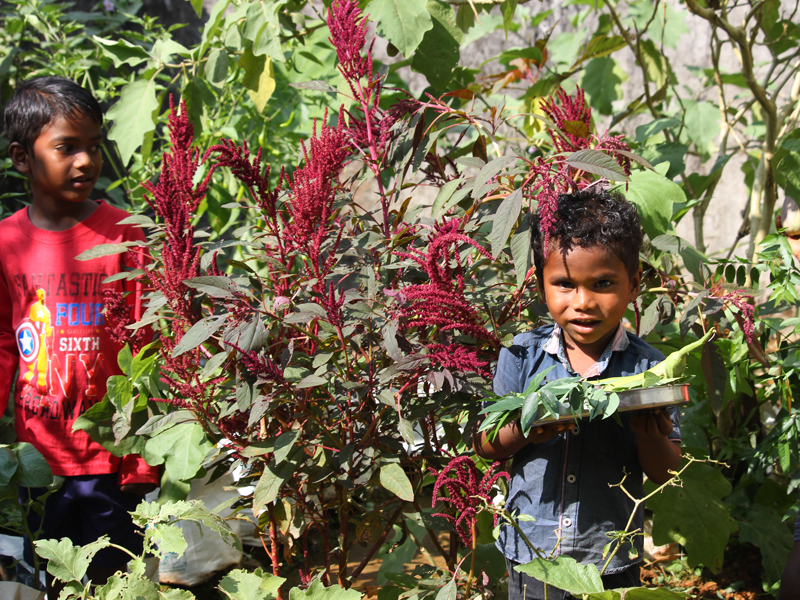
Tribal Livelihood, Food, Nutrition and Health Security through Agriculture: MSSRF has initiated tribal livelihood, food and nutrition security interventions among the Paniya and Kattunaikka tribes in Wayanad district and Kani tribe in Thiruvananthapuram district.
In Wayanad, a 5-year programme on livelihood interventions was completed among 302 tribal families in Cheeyambam 73 colony in Poothadi GP. Major activities completed during the year included (i) planting of 22067 seedlings of pepper as intercrop in coffee garden by way of replacement due to crop damage following the destructive flood in 2018; (ii) providing veterinary support to 72 families engaged in livestock farming; and (iii) providing training in value addition and marketing of non-timber forest products such as honey, wild gooseberry, wild arrowroot and cultivated agricultural produce such as ginger, turmeric, jackfruit, tubers, leafy greens, fruits and vegetables.Animal husbandry activities were strengthened by providing vaccination and nutritional care through medical camps to cope with climate change–related health hazards. A total of 49 families who had taken loans for cow units and 23 families for goat-rearing repaid their loans on time and Rs 263914 was remitted. As part of capacity building, 35 sessions covering processing and marketing of value-added food products, livestock management, community leadership, women’s empowerment and exposure visit were conducted. Collection and sale of wild honey and arrowroot yielded a benefit of Rs 3000 per family while the return from goat-rearing was about Rs 34000/family. A pilot project was initiated in Meenangadi to introduce medicinal plants as intercrop among coffee in order to enhance the income of coffee farmers. MSSRF is working with 150 tribal farmers in cultivating five selected species of medicinal plants with high commercial value.
In Thiruvananthapuram, 500 Kani tribal families from 19 hamlets of Vithura GP are the primary stakeholders. Distribution and planting of 6400 pepper seedlings was completed successfully with the active participation of Village Planning Committees (VPCs). The VPC comprised of 19 members (male: 8; female: 11) who were selected leaders to represent the 19 hamlets. The survival rate of crops such as pepper (85 per cent) arecanut (58 per cent) and clove (60 per cent) during the period was rated good. Toolkits containing five items – two sets of garden hoes, pickaxes, garden knives and a garden basket – were provided to the 500 families for supporting activities in their own farmlands. Seeds of the medicinal herb Curcuma aromatica were distributed and planted in 61 acres of land. Organic manure and vermicompost, to the tune of 19.5 tons, were also distributed for supporting crop cultivation. Training programmes conducted included 14 leadership sessions for VPC team members, 19 sessions for the members of 19 family groups in the intervention site and 6 sessions on food processing and value addition for women groups. A total of 479 females and 190 males benefited from these capacity-building activities.
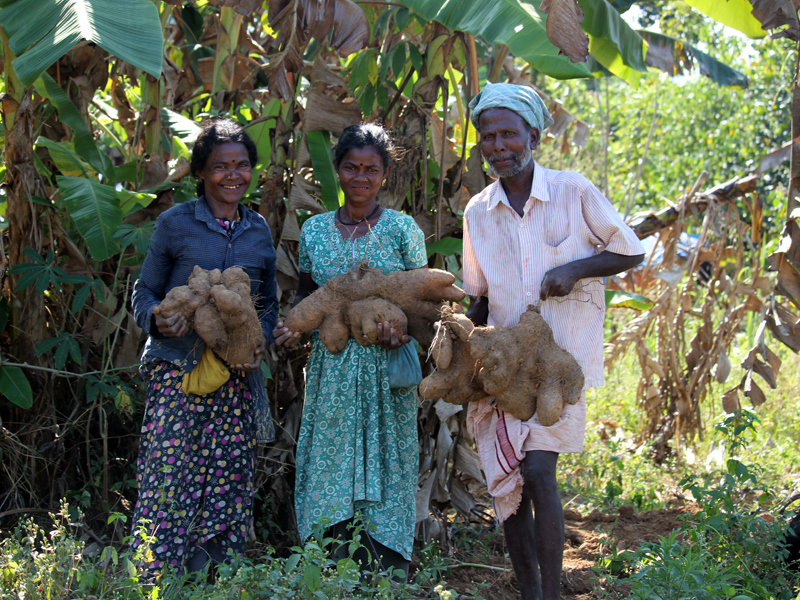
Agriculture Production Enhancement through Microbial Inputs: The microbiology and the tissue culture laboratories’ research activities on biofertilizers and plant growth promoting rhizobacteria, tissue culture of important crops and mushroom cultivation continued. Microbial inputs, such as Pseudomonas fluorescence, Trichoderma harzianum and T. viride, were produced and distributed to around 1000 farmers to control various pests and diseases affecting the growth of pepper, cardamom, ginger and vegetables. Three WSHGs were trained in the production, use and application of bio-inputs. The production technology for bio-inputs was transferred to the WSHGs, and they took up this an activity for additional income generation. During the reporting period, 2.3 tons of Trichoderma spp. and 2.5 qtl of Pseudomonas spp. were produced and sold to the farmers. In addition, 12 tons of vermicompost enriched with T. harzianum were sold to farmers in Idukki.
Three hundred tissue-cultured saplings of banana were raised in the laboratory and planted in trial plots for yield trials. Varieties tried included Attunendran, Nadannendran and Grand Nain. These saplings were given to six farmers within and outside the district for field trials. Another 300 saplings of banana are being raised in the laboratory for the hardening unit. An entamopathogenic nematode Heterorhabditis indica is the latest addition to the laboratory during the reporting period.
During this period, 535 students from various schools and colleges and 441 farmers visited the laboratory for basic knowledge about the functioning of a laboratory and for availing farm input services rendered by the laboratory.
Sustainable Watershed Development Plan: This ongoing project is focused on sustainable development in 30 village watersheds of Wayanad district. Support services were facilitated for Village Watershed Committees (VWCs) with an average of 14 members in each committee in the areas of sustainable farming, capacity building through training sessions and auditing. An area of 6440 ha was covered under sustainable farming, which benefitted around 6200 families. The interventions aided in converting 15 acres of fallow land to land fit for rice cultivation in Periya and Athikolly watershed areas. Farmer groups in the area produced around 5 tons of pulse seeds and distributed 640 kg to 32 farmers. Eleven bi-monthly review meetings were conducted at CAbC for VWC representatives.
NABARD (National Bank for Agriculture and Rural Development) IWMS (Integrated water shed management scheme) Noolpuzha Watershed: MSSRF initiated the integrated watershed management programme in five villages of Noolpuzha GP. The goal of the project is to devise a watershed approach to enhance the water availability and water use efficiency in selected villages. A VWC has been formed at the watershed level and a Project Monitoring and Implementation Committee (PMIC) at the district level.
NABARD KFW (Kreditanstalt für Wiederaufbau) Soil Project: KFW soil project-integration of watershed development for rehabilitation of degraded soil and climate change adaptation was initiated in November 2019 at Chettipambra and Pannikkal watersheds. The goal is to promote investments in improvement, stabilization and conservation of natural resources, minimize the risk of climate change and increase the productivity and income of communities living in the watershed areas.
203.4 Grassroots Initiatives
Wayanad Agri-Marketing Producer Company: The outlet for ‘Safe to Eat’/Organic Eco Shop at Kalpetta has ensured marketing of quality products such as organic rice, coffee, spices, pulses, seasonal vegetables, fruits, honey and diverse value-added products. The FPC has increased its membership from 80 to 125. It has procured and sold 22000 kg of vegetables, 3500 kg of traditional rice, 1000 kg of scented rice (Gandhakasala), 300 kg of honey and 200 kg of value-added products of coffee and spices during the reporting period. As part of business promotion, Wayanad Agri-Marketing Producer Company (WAMPCo) participated in Pre-VAIGA Fest 2019 in November 2019, organized Onam Chanda during 3–11 September 2019 at Kalpetta, participated in an exhibition during 7–9 August 2019 at Chennai and conducted a Mango Fest during 22–27 May 2019. The turnover of the FPC in 2019–20 was Rs 11.10 lakhs.
